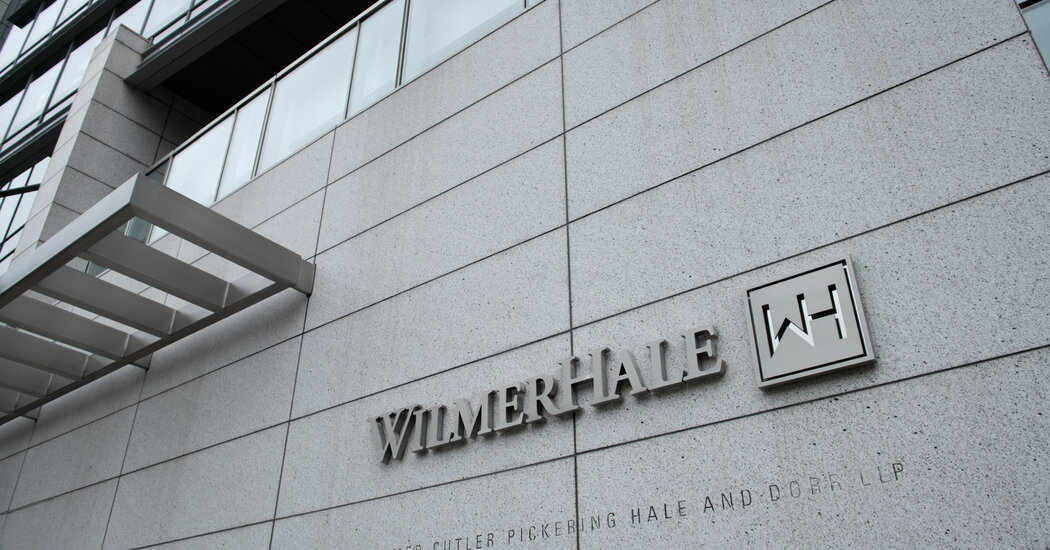Here is the result in plain text:
The nation’s legal profession is being split between those that want to fight back against President Trump’s attacks on the industry and those that prefer to engage in the art of the deal.
Two big firms sued the Trump administration on Friday, seeking to stop executive orders that could impair their ability to represent clients. The lawsuits filed by Jenner & Block and WilmerHale highlight how some elite firms are willing to fight President Trump’s campaign targeting those he doesn’t like, while others have cut deals to appease the president.
In recent weeks, Mr. Trump has issued similarly styled executive orders against firms that he perceives as enemies and threats to national security. The orders have stripped lawyers of security clearances, barred them from entering federal buildings and discouraged federal officials from interacting with the firms.
Jenner & Block said in a statement that its suit was intended to “stop an unconstitutional executive order that has already been declared unlawful by a federal court.” A third firm, Perkins Coie, has also sued the Trump administration over the same matter, and had some early success in stopping the executive order.
Jenner & Block also created a website – “Jenner Stands Firm” – to publicize its filing and to highlight newspaper editorials criticizing the executive orders and comments from law school professors questioning the legality of Mr. Trump’s actions.
The effort to fight back in a public manner stands in contrast with the way other firms have handled Mr. Trump’s campaign against them. Last week, the law firm Paul Weiss announced an agreement in which Mr. Trump rescinded his executive order against the firm in exchange for it committing to represent clients regardless of their political leanings and pledging $40 million in pro bono legal services to issues Mr. Trump has championed.
Paul Weiss reached its deal within days of the executive order being issued by Mr. Trump and involved the firm’s chairman, Brad Karp, flying from New York for an Oval Office meeting with the president and some of his staff.
Mr. Karp said in an email to the firm that he moved quickly because Paul Weiss’s big corporate clients were threatened with the “loss of their government contracts and the loss of access to the government” if they stuck with the firm.
Mr. Karp cast the deal as a move to save Paul Weiss, which employs about 2,000 people. He also complained about other law firms not coming out to support Paul Weiss.
But that deal was widely criticized. The firm – which is stocked with Democrats who have opposed Mr. Trump – was seen as bending to the president to protect its bottom line.
A large part of this are business decisions being made by law firms but without all the facts, and these firms are calculating that their clients will feel aligned with their decisions, said Rebecca Roiphe, a former prosecutor and a professor at New York Law School, who specializes in legal ethics.
Mr. Trump has been going after big law firms that he contends have “weaponized” the legal system. He is initially targeting law firms that hired lawyers who were once involved in the many investigations of his actions during his first presidential term and his business dealings.
A White House spokesman, Harrison Fields, said in a statement: “Democrats and their law firms weaponized the legal process to try to punish and jail their political opponents. The president’s executive orders are lawful directives to ensure that the president’s agenda is implemented and that law firms comply with the law.”
The suit by Jenner & Block was filed in federal court in Washington and the firm is asking a judge to step in immediately and stop the executive order, which was leveled against it by Mr. Trump this week. The firm is being represented by Cooley, another law firm. The lawsuit named numerous government agencies and officials as defendants.
WilmerHale filed its lawsuit in the same federal court and is being represented by Paul Clement, a solicitor general during the administration of President George W. Bush.
Both lawsuits seek a temporary restraining order to block the executive orders from taking effect.
Jenner & Block and WilmerHale represent some of the nation’s biggest companies and often deal with regulatory issues before government agencies. Jenner & Block has represented defense contractor General Dynamics, as well as entertainment giant Viacom, while one of WilmerHale’s major clients is JPMorgan Chase.
The executive order accused the firm of engaging “in obvious partisan representations to achieve political ends” and claimed the firm “discriminates against its employees based on race and other categories prohibited by civil rights laws, including through the use of race-based ‘targets’.”
The executive orders against both Jenner & Block and WilmerHale focused, in large part, on the work of lawyers with the federal investigation into ties between Mr. Trump’s 2016 presidential campaign and Russia. The investigation was led by a special counsel, Robert S. Mueller III, a former director of the F.B.I. who was a partner at WilmerHale.
One of Mr. Mueller’s top assistants on that investigation was Andrew Weissman, a longtime federal prosecutor and former partner at Jenner & Block.
One pattern of the executive orders is going after law firms that have employed attorneys that Mr. Trump sees as his personal enemies. One of those is Mr. Weissman, who Mr. Trump has often lashed out against on his social media platform Truth Social.
Mr. Weissmann has a reputation as an aggressive investigator. In recent years, he has emerged as a public critic of Mr. Trump, appearing frequently on MSNBC to provide legal analysis about the range of indictments Mr. Trump faced for his conduct.
In the complaint, the firm said that Mr. Weissman had not worked for it since 2021. It also noted that it has had prominent lawyers from all political parties on its staff.
Source link




